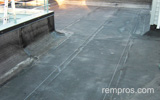
How much does it cost to install flat roofing?
Cost of flat roof installation will depend on a number of factors and total expenses primary determined by roofing materials prices per square and labor cost to complete the work. While calculating gross expenditures for replacing or installing modified bitumen, single-ply membranes or sprayed foam flat roofing systems a number of additional factors should be taken into account. A roofer will calculate the cost after roof inspection, getting detailed measurements, defining roofing material which has to be installed and analyzing work complexity. Itemized estimate will reflect all charges and fees associated with flat roof installation. Materials expenses will be added as a separate cost.
Calculating flat roof installation cost
| Flat roofing prices comparison |
 |
Purchase price of most flat roofing materials is cheaper comparing to roofing products used for slope roof applications including slate, metal or cedar shingles. On average, 45 mil (1.14 mm) thick black EPDM (ethylene propylene diene monomer) roofing is one of the most affordable options. APP (atactic polypropylene) modified bitumen roofing sold in rolls which normally 39” wide can cost even cheaper per square foot. White 90 mil reinforced EPDM will be more expensive. TPO roofing typically have higher price.
Depending on a flat roof system always count additional essential materials which have to be purchased for completing the project. Purchasing roof flashing, underlayment insulation, fasteners and adhesive will increase the total cost to get a new flat roof installed.
| Determining labor cost for flat roof installation |
 |
Roof design, materials, and overall work complexity will affect the cost of labor. Installation of flat roof using torch down method will be estimated at higher rate per square foot comparing to cold or self-adhesive installation methods. Labor cost will increase if roof will have multiple skylights or other objects places on its surface.
Typically there are won’t be any additional fees on a new construction if the roof was designed and build for a certain type of material. But while installing rubber or PVC membranes on an existing roof preparation work is very common procedure. Tearing off old roofing materials, replacing rotten wood, or fixing a roof structure will lead to extra charges.
| Shopping for roofing materials |
 |
There are many types of flat roofing materials available on the market. With developing new products some of the roofing systems including build-up roofs (BUR), rolled asphalt, tar and gravel roofs slowly replacing by modern SFR (sprayed foam), TPO (thermoplastic polyolefin) and EPDM rubber membranes. Local home improvement retailers normally offer very limited selection of modified bitumen membranes or asphalt coated fiberglass base rolls for mop applications. The best way to shop for roofing product at roofing materials suppliers, distributors or ordered directly from a manufacturer. But before making a purchase it is better to consult with a local roofing contractor who will recommend which product to choose based on a climate zone, roof type and building codes. While shopping for a new flat roof always check manufacturer’s warranty as well as resistant of a certain materials to wind and hail damages.

